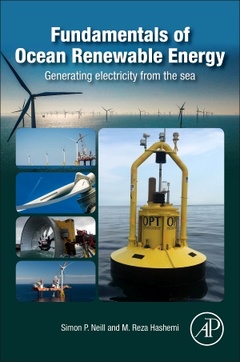Description
Fundamentals of Ocean Renewable Energy
Generating Electricity from the Sea
E-Business Solutions Series
Authors: Neill Simon P., Hashemi M Reza
Language: English
Subject for Fundamentals of Ocean Renewable Energy:
144.35 €
In Print (Delivery period: 14 days).
Add to cart336 p. · 15x22.8 cm · Paperback
Description
/li>Contents
/li>Readership
/li>Biography
/li>Comment
/li>
Fundamentals of Ocean Renewable Energy: Generating Electricity from the Sea presents the basic concepts of mechanics and introduces the various technical aspects of ocean renewable energy. Contents follow a logical sequence, starting with hydrodynamics and then separately examining each conversion technology, with special focus on tidal energy, offshore wind and wave energy, as well as current and ocean thermal energy conversion (OTEC). The authors explore key topics for resource characterization and optimization, such as monitoring and measurement methods and ocean modeling. They also discuss the sustainability, planning, integration and distribution challenges for the implementation of these technologies, including co-location with other systems.
Finally, case studies of ocean energy sites and devices allow for a better understanding of how ocean energy conversion works in real-world settings. This book is an invaluable resource for students at graduate and senior undergraduate level engineering (ocean, mechanical, and civil) and oceanography with prior knowledge of fluid mechanics and mechanics of materials.
1. Introduction 2. Review of hydrodynamic theory 3. Tidal energy 4. Offshore wind 5. Wave energy 6. Other forms of ocean energy 7. In Situ and remote methods for resource characterization 8. Ocean modeling for resource characterization 9. Optimization 10. Other aspects of ocean renewable energy
M. Reza Hashemi is an assistant professor, in the Department of Ocean Engineering and Graduate School of Oceanography at the University of Rhode Island, USA. The University of Rhode Island is the birthplace of the first offshore wind farm in the US: the Block Island Offshore Wind Farm, and has several centres for teaching/ research regarding renewable energy. Hashemi has published over 35 peer-reviewed journal articles, mainly focused on ocean renewable energy and coastal engineering. He has developed and taught several undergraduate and graduate courses about renewable energy, and one of the motivations for this book was to provide a textbook for these courses.
- Presents the fundamental physics and theory behind ocean energy systems, covering both oceanographic and engineering aspects of ocean energy
- Explores the most widely adopted conversion technologies, including tidal, wave, offshore wind, ocean thermal and currents
These books may interest you

Marine Renewable Energy Handbook 324.87 €



